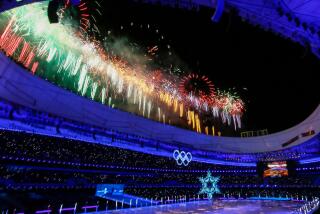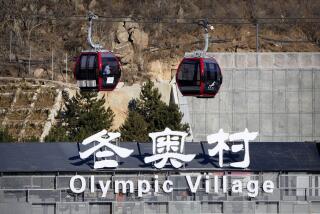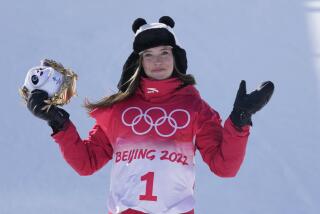Asian Games Report / Randy Harvey : Gymnast Li Ning a Symbol of Chinese Sports Prowess
- Share via
SEOUL, South Korea — Between winning six medals in gymnastics and doing his own laundry, China’s Li Ning has found time to entertain reporters at the Asian Games.
Proving that they can probe as deeply for a man’s cherished secrets as their Western counterparts, Oriental sportswriters have responded to Li’s generosity by inquiring whether he, upon retirement, intends to become a circus acrobat or an actor in kung fu movies.
Fortunately, Li has a remarkable sense of humor, which he displayed at the Gymnastics Hall Wednesday afternoon when he faltered on the parallel bars.
After dismounting from the apparatus, to the delight of the near-capacity crowd of 13,000, he began laughing and mimicking his uncharacteristic clumsiness. Even when you’re going perpendicular on the parallel bars, it beats doing your laundry.
Before competing in the Asian Games, where he won the all-around championship, two other gold medals in the apparatus finals and one in floor exercises, Li had won three gold medals in the 1984 Olympic Games and shared the all-around championship at the World Cup earlier this year in Peking. All of that has made him China’s second-most popular athlete.
The most popular is Jiang Jialing, the world’s best table tennis player. He is to Peking what Larry Bird is to Boston. Jiang can make shots from as far away as Bird, although Bird has a better jumper.
It was in Jiang’s specialty that China not only rejoined the world of sports but also the world, agreeing to lend their paddles in 1972 to Richard Nixon’s Ping-Pong diplomacy.
Two years later in Tehran, the Chinese participated in the Asian Games for the first time and finished third in the medal standings. They improved to second four years later in Bangkok and won in 1982 in New Dehli, ending Japan’s 31-year reign.
Given that, along with their success at Los Angeles in their first Summer Olympics after an extended absence, the Chinese again are favored to win the most medals here.
On the first day of competition Sunday, of 11 gold medals awarded, the Chinese won 9. Through Wednesday, they had won 32, 3 more than the 26 other countries combined. It’s apparent the Chinese have become the Orient Express.
Noting that with a reference to a chapter from China’s history, the president of the Seoul Olympic Organizing Committee, Park Seh Jik, said last week that China has completed the “long march” to the top of the Asian sports world.
So established have the Chinese become in international sports that Peking has been selected as host city for the 1990 Asian Games, and, although the Chinese will not confirm it, International Olympic Committee officials say Peking also is a likely candidate for the 2000 Summer Olympics.
More than anything else, it is because they want to remain in good standing with the Olympic Council of Asia (OCA) and the IOC that the Chinese are in Seoul. Even though they were allied with the North Koreans during the Korean War and still do not have diplomatic ties with South Korea, the Chinese have a delegation of more than 600 here, including athletes, officials and journalists.
That represents a humiliating political setback for the North Koreans, whose efforts to organize a boycott of the Asian Games went south when the Chinese agreed to go south. Nine OCA countries are not here, but not all declined invitations for political reasons.
The Chinese say that their presence here does not guarantee they will return for the 1988 Summer Olympics, but South Korean officials are confident.
Not overconfident.
If the South Koreans learn anything from Peter Ueberroth’s book, “Made in America,” it is that the Chinese will keep you guessing. He thought he had lost them in 1982 because they didn’t like the Rose Parade.
According to Ueberroth’s account, the Chinese were offended because ARCO’s float, which had an Olympic theme, included Taiwan’s flag but not China’s. ARCO, Ueberroth wrote, lost its off-shore drilling rights in China for several months until it made the appropriate apologies.
So far, the South Koreans are doing everything possible to assure that the Chinese experience here is positive, including granting their request to change the name of the country from Choonggong to Choongguk. In Korean, Choonggong translates to Communist China and Choongguk to China.
But the Chinese by any name still aren’t entirely ready to accept South Korea’s hospitality.
Since no commercial airlines operate between China and South Korea, the Chinese chartered planes here and sent their money through an American bank so as not to have any dealings with a South Korean bank. Also, their athletes are doing their own laundry instead of using the service supplied in the Asian Village.
Their sportswriters travel in their own bus instead of the official media buses. The Chinese reporters even brought their own driver, who had never been to Seoul and reportedly has gotten lost upon occasion.
Also reported lost have been several Chinese golf balls.
Competing in an international golf tournament for the first time, the Chinese did as well as expected, which wasn’t well at all.
Considered a bourgeois sport and banned by Mao Tse-tung, golf didn’t resurface in China until 1984 with the opening of the country’s first course. Three more courses have been built since, but they are used primarily by visiting businessmen. There are only 30 Chinese golfers.
Four of them completed the fourth and final round of the Asian Games tournament Wednesday at the Hanyang Country Club outside of Seoul. China finished 11th among 11 teams, right behind Bahrain and Bhutan.
China’s best player, Zheng Wenjun, finished 34th among 44 players after shooting 90-84-80-81--335.
China’s worst player, Wu Jinjiang finished 44th, shooting 91-100-93-88--372.
Talk about a long march.
More to Read
Go beyond the scoreboard
Get the latest on L.A.'s teams in the daily Sports Report newsletter.
You may occasionally receive promotional content from the Los Angeles Times.






